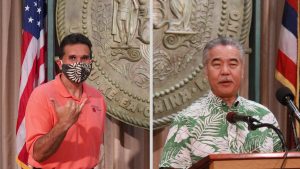Governor extends quarantines, begins next phase for the state
Posted on Apr 30, 2020 in Capitol Connection, Featured“The mayors and I believe that florists are one of the businesses that could operate in a way that protects customers and employees. They and others would be included in the first phase of designated businesses allowed to reopen as we enter this next phase of COVID-19 and continue to remain vigilant.” — Gov. David Ige

Monty Pereira, sales and marketing director at Watanabe Floral, said to the governor, “I want to express my sincere gratitude on behalf of all the flower shops and farms in Hawai‘I, especially the mom and pop shops. We know that flowers can have a positive health impact on the elderly and everybody’s mental health.”
With the avalanche of COVID-19 news, how do we make sense of it all? What resources are there to help? And what is the outlook for a “new normal”? This issue of Capitol Connection has gathered some of the most important links and answers for quick reference — along with a few bright spots to give us all some hope. (For details, go to the governor’s website, Honolulu Star-Advertiser’s Covid-19 Care Conversation, and the Hawai‘i COVID-19 site for the latest updates.
Q. What has inspired you most about the community response to the pandemic?
A. I know people really care about our community — that’s the Hawai‘i way. What has been so impressive — even with all the stress — is how people have complied with the restrictions. All this is making a huge difference to keep our infection rate so low, especially compared to other states. We want to keep it that way.
Q. Why are the current mandates important and what will a phased reopening look like?
A. We know people want to return to work and life as they knew it, but the reality is COVID-19 has changed every aspect of our lives. We have to make sure we’re keeping people safe, or we’ll see a spike in cases. We’re extending the stay-at-home order and 14-day quarantines for travelers, but we’re working with the mayors on a phased reopening of businesses under certain conditions to minimize direct contact and risk of infection. Statewide, we’ll also need more testing, surveillance and contact tracing. Our economic recovery group, led by Alan Oshima, will be offering general guidelines, sector by sector, in collaboration with the counties.
Q. What are some of the biggest challenges to reopening the state to tourism?
A. The big question is how do we balance restarting tourism to help our economy with community health and public safety? We’ve added improved measures for screening, monitoring and enforcement, but for the future we’ll need to reinvent the hospitality industry in a more sustainable way and determine how we’ll promote Hawai‘i as a safe and healthy place to visit. That means visitors need to share in the responsibility for keeping us all safe, and hotels and other accommodations need to be partners in this to monitor visitors.
Q. What is the outlook for making up what is estimated to be a $1.5 billion state budget shortfall?
A. Governors across the nation — both Democrats and Republicans — have told the president and Congress our number one priority is federal help for the states for current budget issues. We’ll have a better idea on May 10 what the tax revenue picture will look like for Hawai‘i. We’re going to explore every option, including cost controls and using other reserve funds. Many state employees are delivering critical services, and salary reductions or furloughs for state workers will be a last resort.
Q. On a personal level, what has worried you the most?
A. As parents, Dawn and I worry about our children on the mainland who are near hot spots. One of our daughters, a nurse in Washington state, had her first potential COVID-19 patient a few weeks ago in a dialysis clinic. She was very concerned about having access to PPE (personal protective equipment). I just want people to keep taking this deadly virus seriously and stay safe.